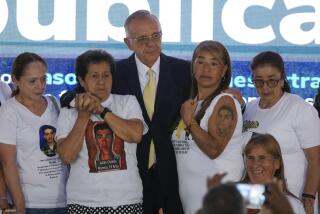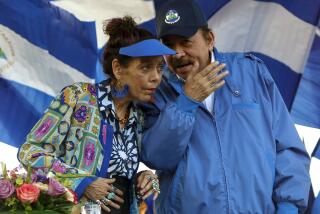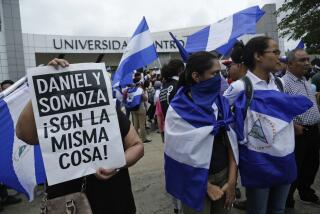Inquiry Into 6 Jesuits’ Slaying Focuses on Army : El Salvador: Troops who were in the area are being interrogated. The president offers a $250,000 reward.
- Share via
SAN SALVADOR — President Alfredo Cristiani said Saturday that the official investigation into last month’s assassinations of six Jesuit priests is focusing on the Salvadoran armed forces, but he refused to blame the murders on the military.
Cristiani said FBI and Salvadoran investigators have the names of all soldiers posted in the area of Central American University on Nov. 16, the night the priests, their cook and her daughter were shot to death at the Jesuit residence there. Sources close to the investigation said interrogations of the nearly 200 soldiers and their commanding officers have begun, and some of the men will be required to take lie-detector tests.
Cristiani also said that he is willing to resume peace talks with the guerrillas battling his government if the rebels stop fighting in civilian areas by Friday.
He said that representatives of the two sides could meet in Caracas, Venezuela, beginning Dec. 20 to arrange a cease-fire and negotiate a peace by Feb. 15. After that, he said, the rebels would be expected to join the political process.
The president, who is under intense pressure from the United States to solve the killings of the priests, offered a $250,000 reward, immunity from prosecution and protection to witnesses who “indirectly participated” in the murders.
At the same time, however, Cristiani asserted that the only witness to come forward so far in the case--a cleaning woman who was spirited to Miami under heavy guard after testifying before a Salvadoran judge--has recanted her statement under FBI questioning.
Roman Catholic Church officials have privately protested the U.S. interrogations of Lucia Barrera de Cerna, who earlier had testified she saw uniformed gunmen enter the university the night of the murders. Since arriving in Miami, Barrera de Cerna reportedly changed her story twice as she was submitted to six polygraph tests over a three-day period, according to sources involved in the investigation. She failed all six tests, the sources said.
Church officials suggested that the woman might have been coerced or intimidated.
But William Walker, U.S. ambassador to El Salvador, denied that the woman had been pressured and said he was disappointed that her testimony may not be usable.
“Why would anyone think . . . we would go to all that trouble (of relocating her and her family to Miami) just to discredit her?” he said. “Our efforts are to get to the truth.. . . I think (the investigation) is moving just as fast as (the government’s) operational capacity allows.”
American officials have said that both the survival of Cristiani’s administration and the continuance of U.S. aid to El Salvador--more than $1 million a day--could be in danger if the Jesuit case is not solved.
The priests, including university rector Ignacio Ellacuria, were killed during an overnight curfew in an area that had been militarized because of a fierce guerrilla offensive launched in the capital Nov. 11.
Two army units were stationed less than a mile from the campus that night, and Treasury Police were posted at a vacant office building about 500 yards from the site of the murders, sources close to the investigation said. Security forces had searched the university residence three days earlier.
“We obviously now are gearing the major strength of the investigation within . . . the armed forces,” Cristiani said.
Members of Cristiani’s Cabinet and the armed forces have publicly blamed the killings on leftist Farabundo Marti National Liberation Front (FMLN) rebels. Cristiani said he would wait for investigators to determine the culprits but added that he could not rule out the armed forces, the extreme right or the left.
Cristiani spoke at a press conference shortly before boarding a flight to San Jose, Costa Rica, for a Central American summit scheduled to start today. He will join the presidents of Costa Rica, Honduras, Guatemala and Nicaragua for a two-day meeting aimed at salvaging a regional peace plan.
The two-year-old plan was dealt a near-fatal blow last month when El Salvador suspended diplomatic relations with Nicaragua for allegedly supplying weapons to the Salvadoran rebels. The Salvadoran government had discovered a shipment of anti-aircraft missiles aboard a Nicaraguan government plane apparently destined for the guerrillas.
Cristiani, remarking on another unsolved case of political violence, blamed the Oct. 31 bombing of a crowded union hall, which left 10 people dead, on FMLN rebels. He said a captured guerrilla had told authorities the bombing was designed to “create martyrs” for the leftist insurgency.
More to Read
Sign up for Essential California
The most important California stories and recommendations in your inbox every morning.
You may occasionally receive promotional content from the Los Angeles Times.













